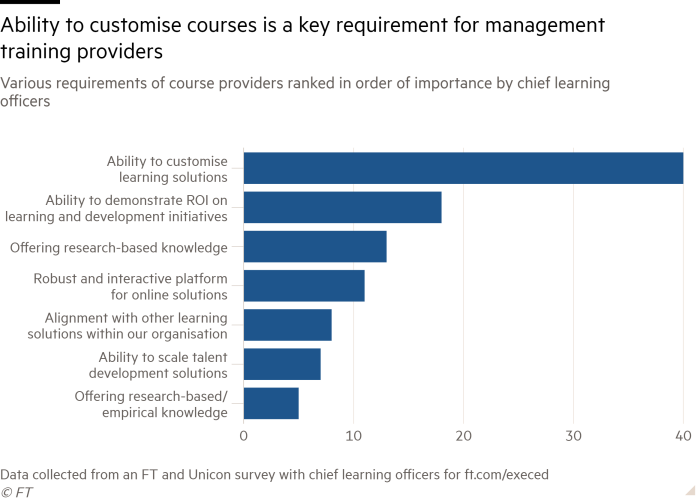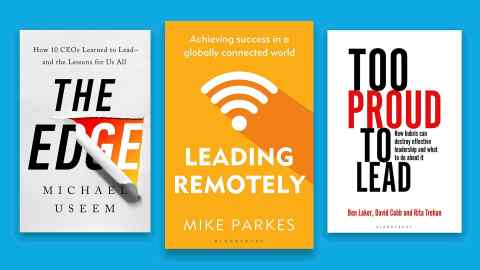Enterprise Faculty Briefing: The after-life of acquired corporations

Welcome to the Business School Briefing. We offer you insights from Andrew Hill and Jonathan Moules, as well as a selection of the top stories read in business schools. Edited by Wai Kwen Chan and Andrew Jack.
Andrew Hills Management Challenge
Listed companies typically only have a 50-50 chance of surviving the next 10 years without going bust or taking over, according to a new study of UK listed companies I wrote about this week. Of a cohort of 1,513 in 1948, only 19 were independent in 2018.
Recommended
So much for the half-life of companies, what about their afterlife once it’s acquired and assimilated? The lack of information after the takeover makes it hard to tell how they are doing. For my Management challenge, tell me what you would reveal to buyers five years after an acquisition to show how well the company they have bought is doing. Send your quick thoughts to [email protected].
Last week I asked what Nestlé should do with its “unhealthy” products. Toby JW Head suggested, “Make them with the best ingredients you can get, ask for a premium. . . and market [them] as a pleasure on rare special occasions, because it’s earned. ”Apart from that, I also liked the response from @DavidLGReilly on Twitter:“ KitKat is a monumental chocolate experience, I would tell you to cheer up, we need more joy . “
in the keep looking This week, you can sign up for a free tour of the wide-ranging FT Live Digital Dialogue that I recently chaired, including Mitchell Baker, chairman of Mozilla, and author Margaret Heffernan. They got a lot of insight into the “post-pandemic world” and touched the future of technology and the topics that would interest them in business books. If you are a writer or prospective writer and are planning to compete in this year’s FT / McKinsey Business Book of the Year Award or the Bracken Bower Prize, this is a must.
News from Jonathan Moules’ business school
After a year of online tuition, the season of virtual graduation is coming, and business schools are again trying to take advantage of technology to find opportunities that would be impossible for in-person events. Skema Business School broadcast its ceremony to more than 5,000 graduates across three shows on five continents, making it a lot easier for students, their friends and family to feel part of the event. The Hollywood-style show – including a virtual futuristic city called Skemapolis created specifically for the event – was also delivered in French and English.
Skema broadcast its graduation ceremony to more than 5,000 graduates © Skema Business School
Recommended
MBA students interested in the art market can gain technical insight through a program at Geneva Business School to develop their careers. Specialized MBA programs have been in vogue in recent years and support students who do not want to pursue conventional MBA career paths such as investment banking and consulting. Art colleges have also partnered with business schools to create MBA programs. However, the MBA Fine Art International Management claims to be the first to specialize in the skills collectors, dealers and artists need.
For further reading this week, I recommend this Harvard Business Review article on the need to lead with humanity. It was written at the start of the pandemic last year but is relevant to this day.
Data line
The Chief Learning Officers were asked to evaluate various requirements they have from course providers offering management and executive programs. First and foremost was the ability to customize training, followed by a demonstration of the return on investment (ROI) of courses, say Leo Cremonezi and Andrew Jack. Offering research-based teaching is the least requested requirement.

Further results of the CLO survey can be found here.
FT Business Books of the Month
Recommended

Find out in this month’s top titles how hubris can destroy effective leadership and the new world of work.
Business leaders face an obstacle because of the pandemic: managing employees remotely.
Mike Parkes, in his book Leading Remotely, shares empirical research showing how executives have successfully overcome the challenges of remote leadership and aims to answer the fundamental question: How do you stay close to the company while you’re out of it Operate remotely?
How the 2021 class can make up for lost internships
Recommended

According to Prospects, a specialized professional organization for college graduates, only 17 percent of undergraduate students in the UK have gained work experience in the past 12 months.
Students have missed hands-on skills building experiences, but universities are helping fill the gaps.
Top business school reads
Recommended

Great Britain is pushing for the City of London to be removed from the G7 global tax plan. Great Britain should be one of the countries pushing “for an exemption from financial services”
Defiant Johnson Will Not hesitate to suspend Northern Ireland Protocol UK Prime Minister says EU leaders are draconian on trade controls on goods
US consumer prices rise fastest since 2008 Hotter than expected readings are coming amid concerns over inflationary pressures as the economy reopens
How well do you know the news?
Answer our 10-question quiz.
Back problems
To view previous newsletters, go to: ft.com/bschool.
If you are an FT subscriber and this email has been forwarded to you, you can sign up for the FT Business School Briefing.



